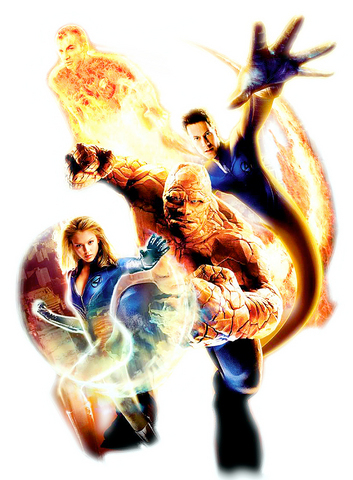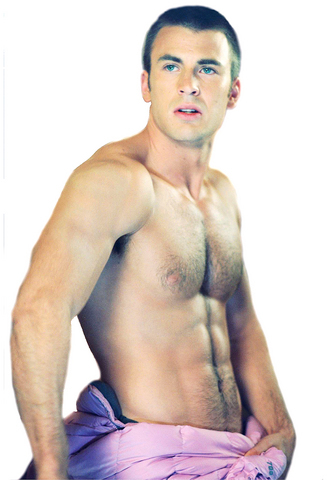Somewhere between Tim Burton's Batman and Christopher Nolan's version of where Batman began, superhero movies misplaced a key element in comic books: The ones we cherished 30 years ago never took themselves too seriously. Filmmakers, even those raised on Marvel and DC comics, are so determined to make superheroes mythic that most of the fun gets squeezed out, unless "fun" is determined by how many things blow up.
Fantastic Four leaves its fair share of rubble behind, deals with potentially crippling character flaws and is agreeably silly about doing it. That's refreshing after so many dark sides and so much melodramatic fantasy have flashed before our eyes.
Finally, summer movie action feels a little more like sunshine.

As usual, the topic is the origins of the crime-fighting quartet and their arch nemesis, Dr Doom. The Fantastic Four comic books missed the wave that swept X-Men and Spider-Man into mass consciousness, so there are still some surprises in the plot. The screenplay, by Mark Frost and St Pete Beach resident Michael France, keeps it simple, a little stupid, and briskly paced.
We meet Reed Richards (Ioan Gruffudd, King Arthur), a mild-mannered scientist whose bankruptcy has him begging for work with a former MIT classmate, uber-mogul Victor von Doom (Julian McMahon). Victor's assistant is Susan Storm (Jessica Alba), Reed's ex-girlfriend, whose brother Johnny (Chris Evans) is a show-off pilot who once chafed under the command of Reed's best friend, Ben Grimm (Michael Chiklis, TV's The Shield). Right away, we have five people with as many sources of tension between them.
Reed's program to regain prestige and money involves borrowing one of Victor's spaceships to investigate a cosmic storm heading for Earth. Nice guy that he isn't, Victor picks Johnny as chief pilot, relegating Ben to the co-pilot's seat. And he doesn't mind rubbing his romancing of Susan in Reed's face. In fact, it's Victor's marriage proposal that leaves the crew exposed when that storm approaches sooner than expected.

Being bombarded by radiation affects everyone's DNA profiles in ways the screenplay presents with the economy of comic book panels. Reed turns into something like Stretch Armstrong, while Susan gains the power of invisibility and Johnny can will himself on fire. Ben's transformation is the most drastic, his body hardened into a mini-mountain with superhuman strength.
Victor's vanity and sanity are bruised when his flesh turns into metal that is magnetic, and it doesn't help when the others get lots of publicity when they're introduced to the public during a bridge catastrophe. When they get nicknames -- Mr Fantastic, Human Torch, Invisible Woman and the Thing -- Victor decides to become Dr Doom.
Fantastic Four doesn't have a grand scheme to foil, just petty squabbles magnified to outrageous proportions by science fiction fate. The movie could use something meatier than a jilted Dr Doom turning a college grudge deadly. But that's the kind of simple "drama" upon which Marvel built an empire.
The best scenes in Fantastic Four usually involve Ben/Thing dealing with sudden ugliness, losing his fiancee and learning that true love is blind.
Reed's problems are lightweight stuff, but Gruffudd turns them into vapor; he's a bad casting choice simply because he's too geeky compared to the comics.
The love triangle has a little sap running. Johnny's impulsiveness and smart mouth are funny, but Story spends a little too much footage on his extreme sports flings before getting to the payoffs.
Fantastic Four sags in the final reel when the fireworks should begin because Story hasn't set up any fuses except Reed and Victor's rivalry. At least there's a climactic promise of Dr Doom's return to his home country, Latveria, where he plotted his most dastardly acts in the coolest evil lair in 1960s comic books.
Give these guys a sequel, and it's game on.

The canonical shot of an East Asian city is a night skyline studded with towering apartment and office buildings, bright with neon and plastic signage, a landscape of energy and modernity. Another classic image is the same city seen from above, in which identical apartment towers march across the city, spilling out over nearby geography, like stylized soldiers colonizing new territory in a board game. Densely populated dynamic conurbations of money, technological innovation and convenience, it is hard to see the cities of East Asia as what they truly are: necropolises. Why is this? The East Asian development model, with

June 16 to June 22 The following flyer appeared on the streets of Hsinchu on June 12, 1895: “Taipei has already fallen to the Japanese barbarians, who have brought great misery to our land and people. We heard that the Japanese occupiers will tax our gardens, our houses, our bodies, and even our chickens, dogs, cows and pigs. They wear their hair wild, carve their teeth, tattoo their foreheads, wear strange clothes and speak a strange language. How can we be ruled by such people?” Posted by civilian militia leader Wu Tang-hsing (吳湯興), it was a call to arms to retake

This is a deeply unsettling period in Taiwan. Uncertainties are everywhere while everyone waits for a small army of other shoes to drop on nearly every front. During challenging times, interesting political changes can happen, yet all three major political parties are beset with scandals, strife and self-inflicted wounds. As the ruling party, the Democratic Progressive Party (DPP) is held accountable for not only the challenges to the party, but also the nation. Taiwan is geopolitically and economically under threat. Domestically, the administration is under siege by the opposition-controlled legislature and growing discontent with what opponents characterize as arrogant, autocratic

Desperate dads meet in car parks to exchange packets; exhausted parents slip it into their kids’ drinks; families wait months for prescriptions buy it “off label.” But is it worth the risk? “The first time I gave him a gummy, I thought, ‘Oh my God, have I killed him?’ He just passed out in front of the TV. That never happens.” Jen remembers giving her son, David, six, melatonin to help him sleep. She got them from a friend, a pediatrician who gave them to her own child. “It was sort of hilarious. She had half a tub of gummies,